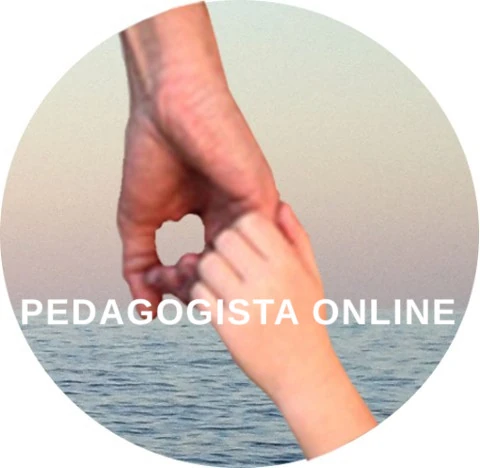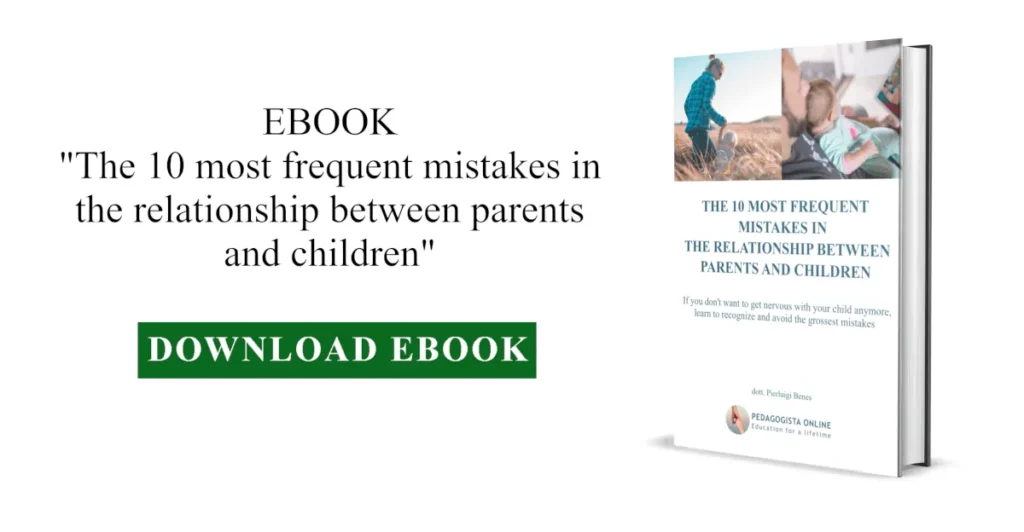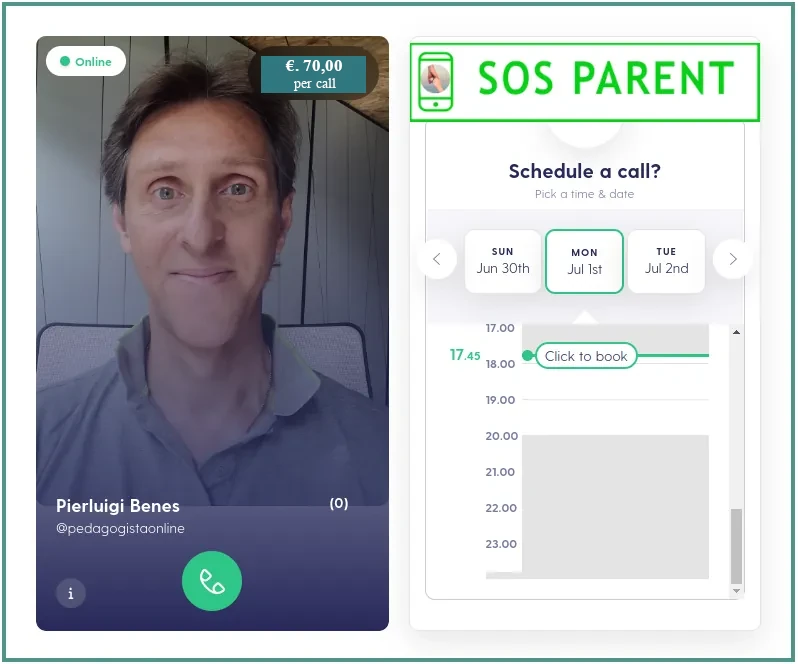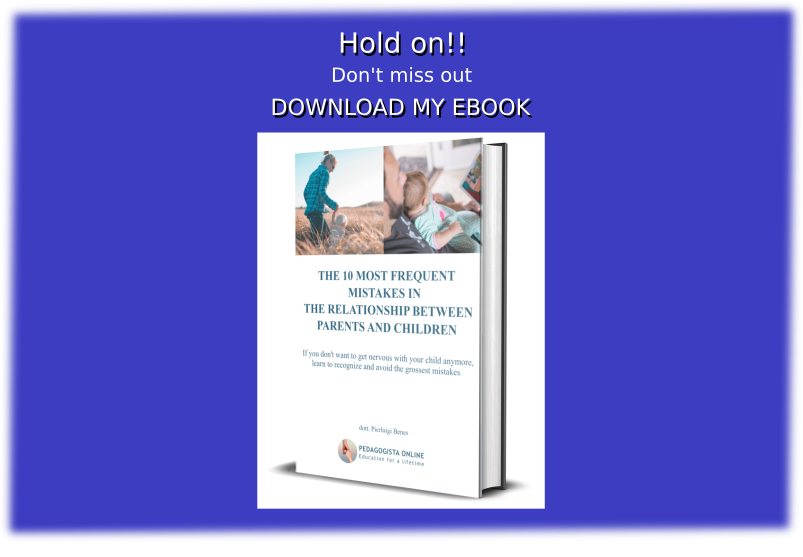
Adolescence, behaviour problems, difficulties, are concepts that are closely linked in the minds of parents; but let’s try to better understand if it is really like that, and let’s start with an example.
Giordy is fourteen years old and comes home after spending the morning at school; he throws his backpack on the ground and goes to his room without saying anything. His father greets him, but his son responds with monosyllables. The mother also intervenes, asking if something happened to cause such an attitude, but Giordy curtly retorts that there doesn’t necessarily have to be a problem if he doesn’t feel like talking. He adds that he is tired and not hungry, he just wants to rest a little without being bothered by anyone else. The conversation quickly runs out of steam, as the boy turns annoyed and heads towards his room.
Chloé also behaves similarly; she is very evasive towards her parents’ attempts to approach and talk to her. The two are often stunned and frustrated by the girl’s detached attitude, now usual in their daily lives. They know that adolescence is a complicated period, but they didn’t think it was that much.
I quoted characters and situations from my novel Being a parent nowadays to express the concept that during adolescence, problems with parents are often the order of the day, and it is not always easy to understand how to orient oneself to maintain appropriate behavior.
A parent once told me that with his son he didn’t know whether to be more annoyed by the boldness of his answers or by the weight of his silences. These are two rather frequent situations when a child goes through pre-adolescence and adolescence; the more they grow, the more it seems that the thing is emphasized. They stay in their room for hours, they are shy in the face of adults’ attempts to start any discussion, they leave the house but it is not clear where they go. In many ways, it seems that they are leading separate lives.
In the end, detachment is precisely what is happening, and it is logical; he/she is forming himself/herself to become an adult, but since his/her sudden changes occur under your eyes, you struggle to recognize them. Sometimes you even want to avoid noticing them because you are always tied to a vision of your child different from the one you are trying to accept.
Like all things, this certainly has an end; sooner or later the boy/girl becomes an adult and takes his/her own path. However, how you get there makes a difference between having a serene and satisfying life, rather than an unbearable one; in fact, mistakes are always around the corner.
If you are navigating these turbulent waters and do not know which direction to take, then I can give you a compass to find the right path and better manage many conflicts that sometimes involve adolescence and parents. Try to patiently follow the indications that I provide you and you will see that the continuous arguments between you, the difficulty of talking and understanding each other, and his/her marginalization from your family life, will soon be part of your past. I don’t promise miracles, but now you can start to communicate on a different level, so as to give your navigation a less turbulent route.
The horizon you need to aim for is to be able to pass the helm of his/her life to your son/daughter, with the serenity that he/she can manage it to the best of his/her abilities. Now I will show you the steps to take.
- How you see the adolescent from the outside
- How an adolescent experiences his/her discomfort
- Adolescence, a phase to overcome
- The key to interacting with an adolescent
- Interacting with the adolescent to help him/her overcome marginality
- The adolescent, an almost-adult
- The three cornerstones of a relationship that reduces adolescent behaviour problems
1. How you see the adolescent from the outside
Educating a teenager is a very stimulating but complex activity; the parent-child relationship during this phase can be rather complicated. Adolescent behaviour problems emerge in all their intensity, so much so that for many people “adolescence – problems” represents a binomial par excellence. I think, for example, of difficult adolescence and aggressiveness, or even just a conflictual mother-daughter relationship, in those moments when the main question a parent asks about adolescence is how to deal with it.
In this phase of development, getting heard by teenagers is very hard; they are preoccupied with other things, with the world they are learning to know, and you are no longer at the center of their universe. Even if they do listen to you, which is not a given, they give you the impression of not hearing you; and often they do it on purpose. Adolescents have their headphones permanently in their ears, their gaze lost in a dimension parallel to yours, their community always at hand, and they constantly provide you with responses that are out of sync with your requests.
All of this is shrouded in the characteristic allure of arrogance that strengthens the annoyance, already considerable, that you can sometimes feel when discussing things with them. This, too, is part of the logic of the detachment they are experiencing: making you feel inadequate is actually a strategy to keep you away, and it pays very well. Of course, you still try to communicate, you put yourself into it with all the good will you have. This is part of your role as a mother or father, even when you would like to push them away from your home, disinherit them and condemn them to damnatio memoriae. But despite your efforts, you never know how to approach them, let alone you know if your behavior will elicit an excessive reaction from them. Sometimes, this situation not only puts you or your interactions with your child in crisis, but also your relationship with your partner, because it can be difficult to put different views together when under pressure.
2. Come un adolescente vive il proprio disagio
In the chapter of your life called “raising adolescents”, it is completely normal to have some difficulty interacting with your children. As you know, and as I will try to explain better, it is natural for them to be somewhat closed off from their parents.
But when the relationship becomes so tense that even the most basic daily exchanges become difficult, then the relationship with your child risks taking a painful turn, which is not functional to their personal development and extremely burdensome for you to live with on a daily basis.
This is especially true when such an attitude also affects the activities that your child carries out; for example, if their school performance is low and they express difficulties in learning at school, or if this lack of interest concerns other aspects of their life, and it pushes them to retreat to their room: no friends, few interests, little studying, and perhaps no desire to think about a possible professional occupation. Furthermore, in some cases, the relationship becomes so difficult that it leads to very painful outcomes, such as eating disorders, more or less serious deviant behaviours, bullying, and more.
Regardless of whether the teenager is a victim of these phenomena or is making other peers victims of their aggression, it is still a negative condition to which one cannot be indifferent, and which they may pay a high price for in their life. Likely, their parents will also pay that cost. What should you do, then, to educate a teenager? Or, better yet, how should you behave towards them during adolescence?
3. Adolescence, a phase to overcome
Personally, I have always considered adolescence to be the time when a parent pays the highest price for their previous educational efforts, compared to the entire life cycle. Of course, I may be wrong; but so far I have not had the opportunity to change my mind. For a parent, adolescence is the harvest season, the one in which the fruits of what has been sown are collected; like all harvests, it can be more or less abundant, depending on how it has been cultivated and also on the weather that may have damaged some of the crop’s potential.
The better the child has been followed from an early age, ensuring adequate responses to their growth needs, the easier it is to find the right compromise with the adolescent in the negotiation of everyday life. In fact, adolescence is also the phase of conflict par excellence, the moment when two realities, two worlds, namely the family and the adolescent, separate from each other like never before.
This happens like all divisions: painfully. Perhaps for a short time or with little intensity, but certainly the formation of that new identity embodied by the boy can only generate an imbalance within the domestic walls; and consequently, a new balance. This inevitably means change, and it affects both him/her and us parents.
Of course, even before, during childhood, and even after, in youth and adulthood, there may be difficulties. With children, there are tantrums or learning difficulties that may arise; with young people, there is the big issue of work, the effort to find a stable occupation. But never like in adolescence is there such a deep-rooted conflict in everyday life.
Given that in moments of conflict one tends to bring out everything that is not going well, the logical consequence is that heavy criticisms or continuous and mutual demands arise during that phase of development. That is why I believe that parents pay the highest price for their efforts here, after which everything can become more tolerable.
4. The key to interacting with an adolescent
I love teenagers and pre-teens; I’ve always had good interactions with this age group. I enjoy the genuineness of their boldness as they grow and become more confident, which allows me to connect with them very well and introduce growth elements where they least expect it. Discussing with a teenager is a much simpler operation than it seems, especially if you have previously built a solid relational foundation and have effectively managed your child’s tantrums.
To adequately communicate with a teenager, you essentially need to possess the right key to interpreting their way of thinking about things and experiencing them, knowing that they expect to receive the maximum recognition possible of their identity from others, even though this identity is not yet well-defined. This is the most intriguing paradox of adolescence: today a singer is considered a god on earth, but tomorrow they will no longer be anyone, because they will have made way for another myth (always far from their world and, therefore, unattainable and unchallengeable). It is precisely this paradox, so evident in many aspects and experiences of your child, that creates the most suitable opportunities in which you can intervene to bring them back to reality and gain more credibility in their eyes. We will see how.
Returning to the key to interpreting their behaviour, I suggest adopting one composed of these three elements: awareness, which consists of realizing what you need to properly relate to a teenager, that is, the right tools; serenity, which you can achieve by showing yourself to be impeccable, and it is a way of being that you need to take care of as best as possible; and effectiveness, which you gain by cultivating a good bargaining ability, and which represents the best lever for being taken into consideration by your child in this delicate developmental phase. In the following lines, you will understand the reason why I point out these aspects and also how to achieve them.
5. Interacting with adolescents to help them overcome marginality
This insight arises from both what I have studied regarding preadolescence and adolescence, as well as from the educational experience I have had with boys and girls of various ages and issues. With regard to my graduate education, for example, I have been able to learn something very important, namely that adolescence puts the boy in a condition of “marginalization”, in the sense that it places him on the margins of many situations and contexts of his life: he is part of a family but lives on its margins since he questions it, although he still has a great need for it. And he doesn’t just do it with the family.
In some cases, a prolonged marginalization is created and this makes extremely difficult for the boy to seize important opportunities, such as being able to obtain a degree or finding a satisfying occupational placement. This is the case of those who attend a course of study, high school or university, but without completing it, or of those who look for a job, but act without any conviction, as if the search itself was their real job.
Essentially, he/she replicates the marginal lifestyle even in those sectors that, in the transition from adolescence to youth, are the most important for investing in his/her future.
Without a job, the boy doesn’t perceive a salary, can’t support himself, can’t leave his original family to create his own, and consequently remains substantially an adolescent even though he/she is already an adult subject. It’s a phenomenon known as «social marginalization». For this reason, adolescence must be accompanied with the right methods, to evolve the person so that he/she reaches a balanced adult age, which allows him/her to become concretely independent and to emancipate himself/herself completely from his/her family.
6. The adolescent, an almost-adult
As your child enters adolescence, from a mental perspective they possess all the “tools” that you do. Like you, they have now reached the final stage of cognitive development, which is the ability to engage in hypothetical deductive reasoning, and they use this ability fully. From this point on, they are capable of abstract reasoning about events, without the aid of direct perception of an experience or object, if they need to identify the rule that governs them in order to hypothesize possible effects that these events may have.
This is what adults do, what you do, which enables you to make reliable predictions about the outcome of something that interests you, such as work, relationships with others, and your life in general. Now, your child can do it too, and they feel very strong about it, so much so that they increasingly overuse it. You often notice this, such as when they question your ideas; they no longer shrug their shoulders like children do, but instead use words and reasoning. Although they follow their own logic, their reasoning is not yet very refined and completely reliable. The teenager still lacks a piece of the puzzle to be fully an adult, and to be able to use reasoning in the way that adults do. Can you figure out what that is?
I’ll provide you with a little help; think about what makes the difference between you today and you a year ago. By now, you should have arrived at the answer: «experience». If you’re 30-40 years old, the difference compared to last year is simply due to one more year of experience on your shoulders. These experiences have certainly changed you, but when you reason, you still essentially use the same cognitive tools as the previous year. The difference is that you compare the results of your predictions with a greater set of reference terms, and you have a few more strategies at your disposal.
Let’s return to your children; now that they’re teenagers, they have a powerful tool in their hands, which allows them to reflect 360 degrees on what catches their attention, but they still do it in a theoretical, abstract way; because they lack a robust comparison with the data of reality, which they will obtain from the experiences they will cultivate in the future. Essentially, we can say that they live in the «year zero» of their adult experience, that is, the moment when they have all the necessary means to be an adult, but they still need to understand how they work, what their strengths and weaknesses are. You, on the other hand, have a lot of experience and you know well if one of your child’s reasoning will be falsified by experience. The problem is that you can’t tell them; at least not in the way you would have used a few years ago.
With this, I have introduced you to a first element of knowledge that you must have the right awareness of to manage your relationship with your child. If you don’t start from this perspective, you won’t fully understand the logic that governs their behaviour, and above all, you won’t appreciate neither the great evolutionary leap they’re making, nor the Achilles’ heel that distinguishes them.
7. The three cornerstones of a relationship that reduces adolescent behaviour problems
Now that you are familiar with these aspects, you can better understand the need to moderate your attitude towards your child, mediating your reactions towards him more than before. The more you take offense and explicitly challenge his choices, the more you push him and yourself into a dead end from which there is no way out. Instead, if you appreciate his attempts to learn to “walk” again with his own legs when he experiments with his new means, you can accompany his still unsteady gait with greater serenity and, therefore, with greater effectiveness.
That being said, I will now indicate the main cornerstones of a successful relationship between adolescence and parents.
a) The three contexts of adolescence
We have talked about your child’s development in this phase and how his mind has matured compared to before. We have also seen that this achievement is not enough for him, because he now needs to confront experience. This ambivalence makes him fragile, as in some respects he is very determined, while in others he is frightened; a fragility that makes him rather rigid in his choices or judgments, and pushes him on the one hand to question his environment of origin and on the other to seek a new environment in which he can feel recognized in his identity. This makes you understand how easy it is at this age to fall prey to ill-intentioned people; on the other hand, these are sensations that we have all experienced.
But how can an adolescent get out of this paradoxical situation, in which the adult world, that of the family, is called into question, and the youth world, of which he has a desperate need to feel fully recognized, is immersed in its own substance and in the same difficulties? The answer is in the type of adult role models he can find outside of his parents: friends, acquaintances, uncles, teachers, coaches, instructors, and all those other significant adults in your child’s life who can help him evolve.
An adolescent, in fact, needs a peer group with whom to question the rules of the adult world to find their own, a family in which to find the necessary reassurance in times of difficulty, which are nevertheless there and are heavy, but also a group of significant adults with whom they can progress. At different times in his life, the adolescent needs these three contexts.
What does it mean to progress? It means that he must be able to find in some people the appropriate stimuli to put the two worlds (youth and adult) together, in order to find a sufficiently acceptable identity that characterizes him, so as to finally be able to access the reality that now concerns him: the adult world.
What can you do to facilitate this process in your son/daughter? Interact with him/her from a certain distance, without being invasive, in order to guarantee him/her the possibility of feeling different from you (which is what he/she wants), but without having to flee from you (which is not what he/she wants). Starting from here, you must wait for them to make their choices and find the most suitable significant figures to build the identity they feel is their own. In the event that they cannot find them, or those they identify may lead them down a wrong path, it is certainly your duty to intervene, but to do so, you must move with the right delicacy, as we will see now.
b) An authoritative attitude
There’s no getting around it, with teenagers you need to be able to have a discussion; and a big part of the work involves the habit of having transmitted to them since childhood a significant ability to listen. The more assertive and rigid you have been in your role as a parent, with little inclination to listen, the more their reaction will be one of closure; so now you need to learn to step back if this hasn’t been done well, in order to have enough flexibility to reinvigorate their listening capacity towards us.
This means that you need to be able to modify your language, to accept that, in turn, theirs is more appropriate to the situation. At eleven, twelve, thirteen years olg age and beyond, it’s no longer possible to think of resolving an issue with a peremptory “Do what I say!” Now you have to be able to replace it with a “It’s preferable that you do it this way if you want to achieve this thing, otherwise you’ll get this other thing.” By doing this, you have to wait for them to experience for themselves the goodness of your advice; and it is precisely there that your authoritativeness is measured: the closer your predictions and hypotheses are to reality, the more credible and therefore authoritative you are in their eyes.
Naturally, your son or daughter will never tell you this, and this is the other difficulty you encounter with teenagers; but you have to know that even though your “authority” could be habitually recognized before and accepted by them, now that “authority” has to be earned in the field day by day, inch by inch, and it’s called authoritativeness. It is with this authoritative approach that you can build an open door towards the teenager; a door that they can cross without hesitation in times of need, to truly return to you.
This door needs to be created because it’s already difficult for them to accept it, but if you make it even narrower, blocked, or subject to unsustainable conditions, it will be very difficult for them to give you the satisfaction of crossing it even once. If there is a way to overcome misunderstandings between parents and children in adolescence, it has these characteristics.
c) The seed of doubt
Now I’ll give you some ideas on how curiosity, very strong in an adolescent, can be a powerful lever to regain their attention.
We’ve said that they’re in a phase of rigidity and don’t accept compromises, that they’ve developed a rather elaborate reasoning and want recognition of an identity that, all in all, isn’t yet fully defined. Well, let’s try to put these elements together to identify a point of strength; I’ll use an example to better convey the principle I want to convey to you.
Many years ago, when I organized summer camps for kids, I had a two-month experience on a beautiful island in my area. The kids who attended the service were between twelve and fourteen years old and were the children of the local restaurateurs and hoteliers. The summer camp was very badly perceived by the kids because it was an obligation they had to endure due to their parents’ significant work activity during the summer period; they would have much preferred to stay at home and go to the beach all day with their friends. Instead, they had to stay with me at the center and do activities, eight hours a day.
While it is advisable to provide a good structure to the day and animation activities with children, the opposite is true for adolescents; the structure should be minimal, barely perceived by them, disguised among activities. So, I gave the kids the possibility to personalize the location and activities according to their tastes and interests under my supervision and following the rules I proposed to share with them. The long faces of the first day disappeared quickly because the activities became interesting, but of course, some of them took advantage of the loose structure of the organization to tease and provoke the others. Therefore, I had to find a remedy during moments of transition when these discomforts arose, like during lunch break, immediately after eating.
One day, while we were finishing our lunch, I told the kids that I was able to see into the past. They started laughing and teasing me. With a very serious attitude, in perfect British style, I insisted, specifying that I could see something that happened in the past with my own eyes. They didn’t believe me. So, I said that I would show them at the end of the break. From that moment on, they started discussing very animatedly among themselves, divided between those who believed that I might be right and those who believed that I was lying or that there was some trick in my words.
I went to my office to read the newspaper; from there I could see the whole group, sitting at the table in the garden discussing together and making all kinds of hypotheses about my challenge: some wanted to understand the trick of my statement, some suggested science fiction solutions, some laughed at others’ hypotheses. They stayed there for three quarters of an hour having a great time, except for occasionally coming to me for some clues. At the end of the break, they came to me to hear my proposal. We went out into the garden, it was a beautiful day; we passed the beautiful pine grove and I pointed out the sun to them. They didn’t understand. So I explained that the light that comes from the sun and arrives on Earth takes about eight minutes for the journey, even though it moves at three hundred thousand km/s.
Therefore, what they were seeing was not really the sun at that moment, but how the sun was in the past; precisely, eight minutes before. Many of them were thrilled with the answer that my challenge led them to, they made a discovery that accompanied them for several days, with research and laboratories that further expanded their stimulation. Others, however, hoped that I had a more stimulating trick to propose to their friends. Someone was disappointed because they expected a sort of magic. Everyone, however, spent a very stimulating hour, and, as far as I was concerned, safely and peacefully. Once the seed of doubt has been instilled in the mind of an adolescent, it produces an unstoppable chain effect; one just needs to find the right lever to turn it into a growth factor. My colleagues from the previous year had sweated their guts out to manage these kids, using even rather drastic methods, such as reprimands, punishments, and more, without achieving particular satisfactions. I systematically gave them alternatives to boredom, leveraging their potential.
Now that you have a better understanding of the perspective from which to interact with your teenage children, you probably have a slightly broader view to better interpret what is happening in the relationship between adolescence and parents. By following these simple precautions, you will realize not only that you have greater ease in living through the difficult moments of your relationship, but especially that that “child” who is beginning to cause you great discomfort is actually a “teenager” on whom you can rely like never before. The sooner you realize it, the better you can deal with the pleasure of a human relationship that is no longer one-sided dependency, but is also based on increasingly frequent moments of mutual support.
Problems with teenagers are commonplace, but so are problems with children; problems should never be dramatized, but rationalized. The real problem with teenagers is not the adolescent crises themselves, but the lack of desire to tune in to these events to govern them or perhaps learn to prevent them. On this, you should now have a little more support, because you know something more about how to safeguard the parent-child relationship in adolescence. If you also want to understand how much you have strengthened the foundations of your relationship so far or how much you should strengthen them to make your relationship more serene, then you can download the ebook that I make available to you for free. It will allow you to no longer get nervous with your son or daughter and learn to avoid the most gross mistakes of parents.





